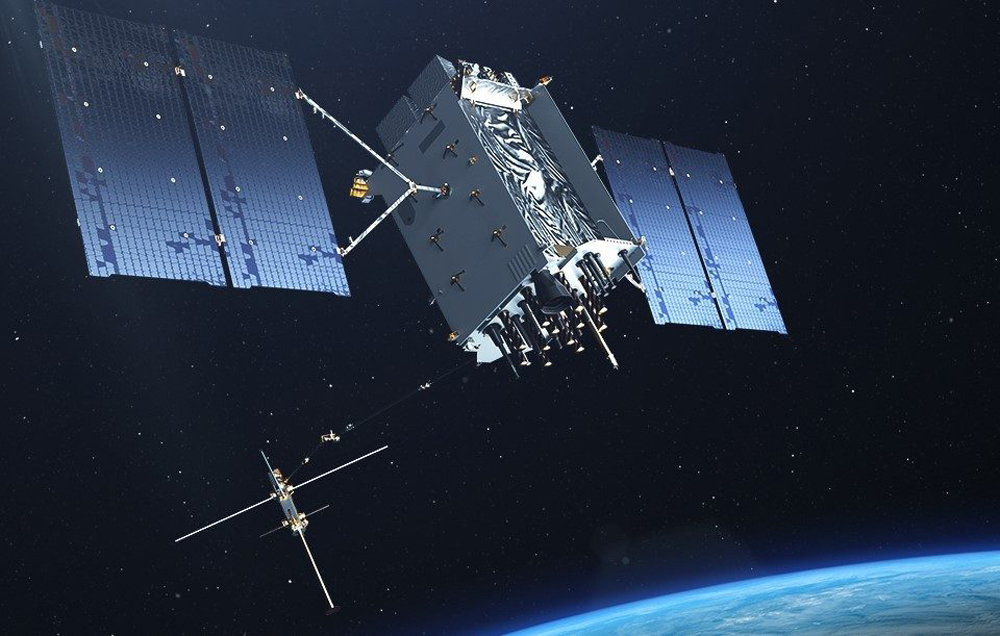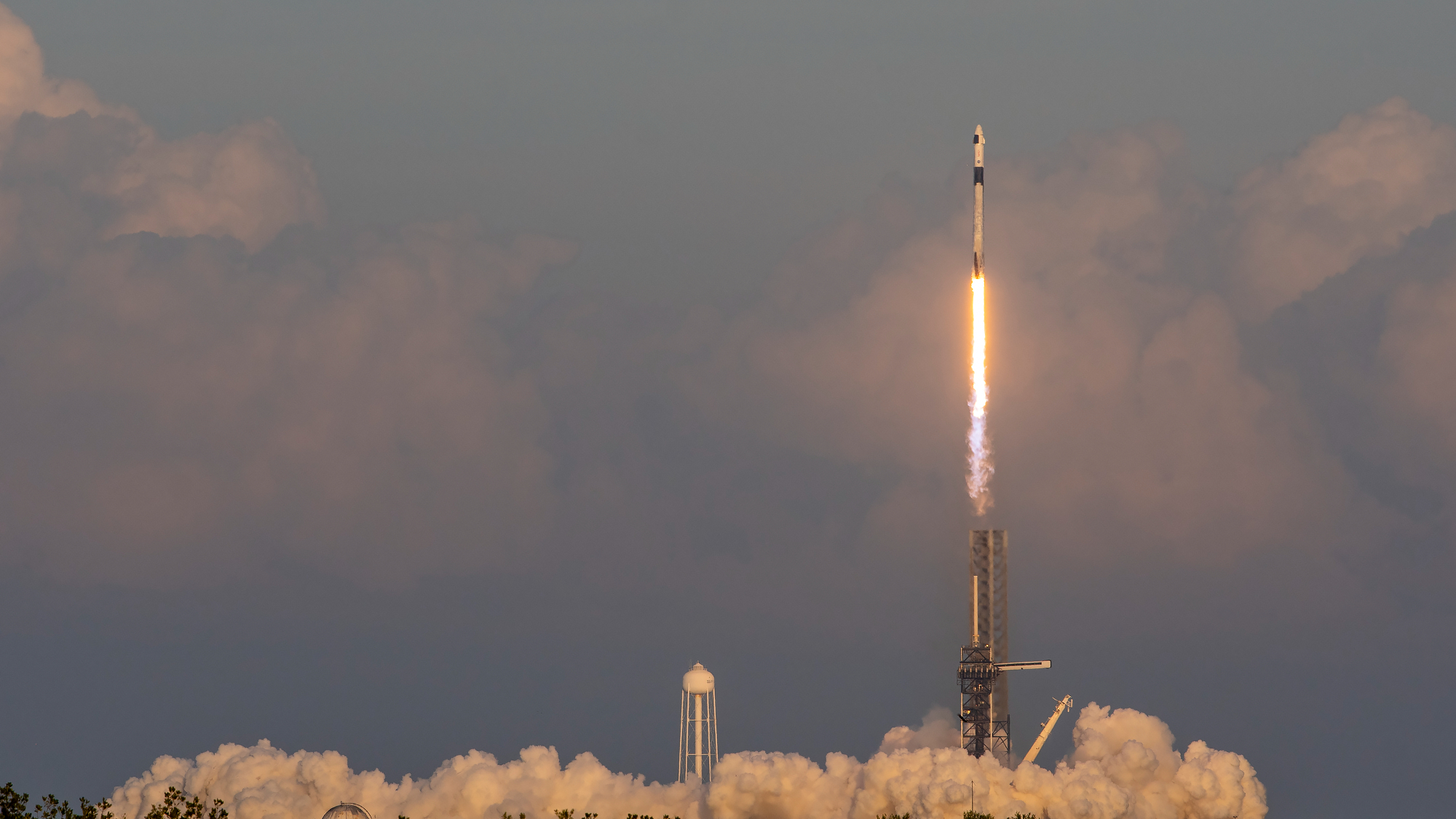Coronavirus pandemic forces US Space Force, SpaceX to delay GPS satellite launch
Scheduled for late April. Now set for June 30.

The planned SpaceX launch of a new GPS navigation satellite this month for the U.S. military has been delayed to at least June due to the ongoing coronavirus pandemic, Space Force officials say.
In a statement released on Tuesday (April 7), officials with the Space Force's Space and Missile Systems Center (SMC) announced that they've postponed the launch "to minimize the potential of COVID-19 exposure to the launch crew and early-orbit operators."
The new global positioning system satellite GPS III-3 was originally scheduled to launch on a SpaceX Falcon 9 rocket from the Cape Canaveral Air Force Station in Florida in late April. It will now launch no earlier than June 30, SMC officials said. That target will be reevaluated in May, they added.
"We do not make this decision lightly, however, given our GPS constellation remains strong, we have the opportunity to make a deliberate decision to maintain our mission assurance posture, without introducing additional health risk to personnel or mission risk to the launch," Lt. Gen. John F. Thompson, SMC commander and program executive officer for space, said in the statement.
Video: How the U.S. Space Force's GPS III satellites work
Related: Coronavirus pandemic: Full space industry coverage
The Space Force's GPS navigation satellite constellation consists of 31 satellites in orbit now. Like its name suggests, GPS III-3 will be the third of a new modernized series (the GPS III block) to join the constellation. The GPS III design offers three times the accuracy and an up to eight-time improvement on anti-jamming capabilities over its predecessor, the GPS II block, SMC officials said.
"The GPS system supports vital U.S. and allied operations worldwide, unabated. As the COVID-19 pandemic is a threat to national security, likewise, rescheduling the launch is in the interest of national security," Thompson said in the statement. "We have to get it right the first time, and protecting our people is just as important as cost, schedule and performance."
Get the Space.com Newsletter
Breaking space news, the latest updates on rocket launches, skywatching events and more!
SMC officials aim to launch three GPS satellites in 2020, with GPS III-3 being the first of them. Its immediate predecessor, GPS III-2, launched in August 2019 and entered service on April 1.
But to launch those GPS missions, SMC officials must make procedure and facility changes at the GPS III Launch and Checkout Capability operations center to reduce the number of personnel on site and support proper social distancing amid the COVID-19 pandemic.
"Once these efforts are completed, and the crews have rehearsed and are deemed proficient and ready to execute under these modified conditions, we fully intend to return to our launch cadence for deploying GPS III satellites," Col. Edward Byrne, chief of the Medium Earth Orbit Space Systems Division, said in the statement.
The GPS III-3 launch delay is not the first for SpaceX due to the novel coronavirus pandemic.
Last month, the company had planned to launch the Earth-observation radar satellite SAOCOM 1B for Argentina, but was forced to postpone the March 30 liftoff when travel restrictions prevented Argentine personnel from reaching the launch site for final preparations.
SpaceX is scheduled to launch its first Crew Dragon with astronauts aboard, the Demo-2 mission, in mid-May. That mission for NASA will launch astronauts Bob Behnken and Doug Hurley to the International Space Station.
- Coronavirus pandemic: Full space industry coverage
- What is the U.S. Space Force?
- Military Space - Spacecraft, weapons and tech
Email Tariq Malik at tmalik@space.com or follow him @tariqjmalik. Follow us @Spacedotcom, Facebook and Instagram.
OFFER: Save 45% on 'All About Space' 'How it Works' and 'All About History'!
For a limited time, you can take out a digital subscription to any of our best-selling science magazines for just $2.38 per month, or 45% off the standard price for the first three months.
Join our Space Forums to keep talking space on the latest missions, night sky and more! And if you have a news tip, correction or comment, let us know at: community@space.com.

Tariq is the Editor-in-Chief of Space.com and joined the team in 2001, first as an intern and staff writer, and later as an editor. He covers human spaceflight, exploration and space science, as well as skywatching and entertainment. He became Space.com's Managing Editor in 2009 and Editor-in-Chief in 2019. Before joining Space.com, Tariq was a staff reporter for The Los Angeles Times covering education and city beats in La Habra, Fullerton and Huntington Beach. In October 2022, Tariq received the Harry Kolcum Award for excellence in space reporting from the National Space Club Florida Committee. He is also an Eagle Scout (yes, he has the Space Exploration merit badge) and went to Space Camp four times as a kid and a fifth time as an adult. He has journalism degrees from the University of Southern California and New York University. You can find Tariq at Space.com and as the co-host to the This Week In Space podcast with space historian Rod Pyle on the TWiT network. To see his latest project, you can follow Tariq on Twitter @tariqjmalik.
-
Lord Hung It's amazing how far GPS has advanced and become ingrained in our world. Without the theory of relativity they wouldn't even work.Reply
Amazing stuff.










